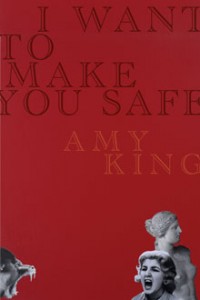Book Review
 It seems like every poem Amy King writes is a more thorough investigation of the self’s responsibility to the other than the last. I Want to Make You Safe is the follow-up to 2009’s Slaves to Do These Things (BlazeVOX) and a maturation of its logic. The books are linked formally and thematically, though I Want to Make You Safe demonstrates a sharpened sense of King’s style, which she uses to perform surgery on the subject and the object.
It seems like every poem Amy King writes is a more thorough investigation of the self’s responsibility to the other than the last. I Want to Make You Safe is the follow-up to 2009’s Slaves to Do These Things (BlazeVOX) and a maturation of its logic. The books are linked formally and thematically, though I Want to Make You Safe demonstrates a sharpened sense of King’s style, which she uses to perform surgery on the subject and the object.
It’s hard to miss associations in a poem titled “Thank God You’re Connecting Things,” particularly when said poem ends with the title of its author’s previous book, and is followed by the current book’s title poem. In “Thank God You’re Connecting Things,” King writes:
Am I that hideous
to nature,
a vagrant released
to pass the egg along,
to spin its threaded
words
between a growing child
and thorns that cling,
about a silence
every doll tries to sing,
every limb longs to breathe,
every fabric moves
to speak:
origins in fields,
slaves to do these things.
The question of the speaker’s obligation to child-rearing is left pleadingly open here. It is answered on the next page in “I Want To Make You Safe.” “Let them grow, these future kids / my womb to fill, my womb well hid.” Here, the speaker focuses attention away from the self and toward the other. This is the move King makes between Slaves to Do These Things and I Want to Make You Safe.
Infancy and pregnancy function metaphorically throughout the text. These themes are crucial to King’s understanding of not just a personal other—a “significant other”—but a universal other, the sociological Other. Children function as imaginings of future selfhoods, and King’s titular desire—the title being a maternal uttering—is to create a safe world for them.
In the course of answering social questions ranging from animal rights to domestic policy, the speaker grows emboldened, like a protective parent. Regarding conservative claims that gay marriage will erode family values: “Kill the family? How about kindle the children / and spark a heart’s arch for us to walk beneath? / The camel through a needle passed, kicking out.” King declares her own freaky authority. “Am I not the rubberized universe?” she asks.
This self-assumed authority feels necessary in a world where an increasingly popular form of relating to the Other is the expression of antagonism to sources of power. Call it an “I vs. you” or “us vs. them” relationship. This relationship is most clearly expressed in “How Will My Enemies,” in which the speaker seeks a place in “the Panopticon’s blindspot.”
I’m McCarthy and Homeland Security incarnate.
For them, I’m the regal eagle to shoot their buttery
bullets at. I wrap the false shroud of Turin about the gaping
hang of their panting heads, flaunting the sum of all I can want.
When the officials we have elected to protect us become wiretapping spies against us, thus rendering the Panopticon’s view limitless, and prescribe police state measures (rubber, or “buttery” bullets) when we choose to dissent, King observes that the only way to retrieve our freedom is to declare it for ourselves, to “flaunt” it, since it is “the sum of all [we] can want.”
In terms of craft, King’s poems are evenhandedly revealing and concealing. Her barrages of stilted syntax and bizarre juxtapositions give way to moments of clarity. To read these poems is to experience the entirety of an anxious, fervent consciousness with a message that aches to pierce through. Aphorisms offer spears of light in the semantic murk of the strange: “People will be what they do to their souls. / Or else the spoons of natural history / go water-witching marble fingerprints.” Humor tends to do the same: “the Genius Dress was far too small / a random pie far too gone.”
As a book, I Want to Make You Safe has the feel of a carved and chiseled object. The connections to her previous book indicate a belief in Spicer’s maxim that a poet only ever writes one poem. King has also created a constellation within Safe itself. Lines from poems early in the book become titles of later poems. The last lines from early poems crop up again and conclude later poems, slightly altered. When these lines appear in new contexts, they demand re-readings of the early poems. A poem from the book’s first of three parts, “A Bruise That Stains the Teeth,” concludes, “I’m the worm by the ember that glows.” “The Worm by the Ember That Glows” appears near the beginning of the book’s third part, thus asking the reader to investigate the relationship of the two poems, which, read together, define a subject who is a container for degradation, (“We still have them then? I mean, / women?”) but is still capable of supreme ecstasy, who “rejoices mid-air for an eternity of seconds.”
King has constructed an edifice in I Want to Make You Safe, one meant to house a moral conscience that deplores the state of the world while offering designs to reach the shared goal of safety.
About the Reviewer
Michael Flatt is an associate editor at Counterpath Press whose work has appeared recently in 32 Poems, SpringGun, Horse Less Press, Samuel Beckett Today / Aujourd'hui, and is forthcoming in The Destroyer.